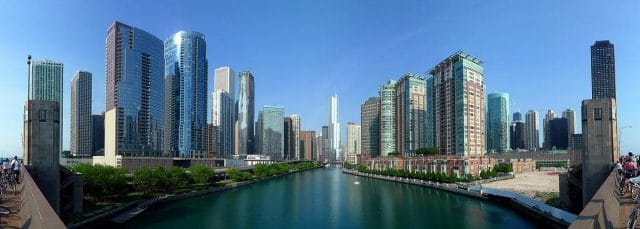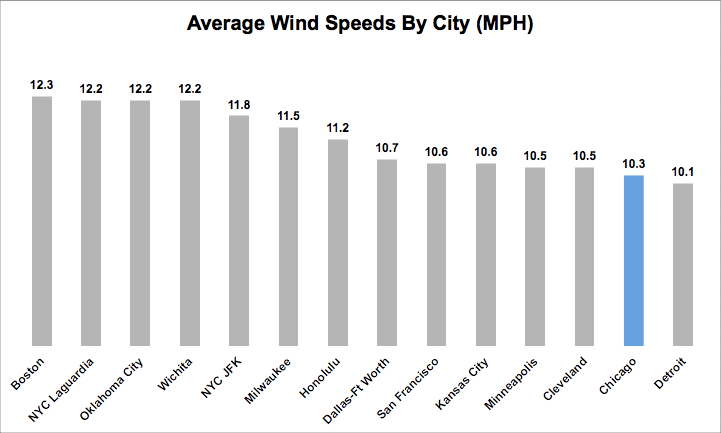
Photo credit: Mindfrieze via Flickr
Chicago is The Windy City. Situated on Lake Michigan, Chicago lives up to its nickname as strong winds often wreak havoc at O’Hare airport and residents regularly experience blasts of wind as they turn into wind tunnels formed by the city’s skyscrapers.
There’s just one problem: Chicago is not particularly windy. Among major American cities, Boston, New York, Dallas, and San Francisco all experience stronger winds. In fact, Chicago can’t even claim to have the strongest winds in the state; Springfield, Illinois, experiences annual winds that are, on average, half a mile per hour stronger than those in Chicago.

Major cities with average winds above 10mph. (Historically as of 2012.) Source: National Oceanic and Atmospheric Administration
According to data from the National Oceanic and Atmospheric Administration, in terms of average annual wind speeds, Chicago is only the 73rd windiest city or area out of the 275 observation stations included in its data tables. Mount Washington, New Hampshire, has the highest speeds at 35 mph; Oak Ridge, Tennessee, has the lowest wind speeds at an average of 4 mph. And as we see in the above chart, even among large cities, Chicago’s winds are not particularly impressive.
When we look at a metric other than average wind speed, Chicago never merits its crown as “the” windy city. In major cities, San Francisco has the strongest winds during most of the spring and summer months, Boston has the strongest winds in the winter, and Buffalo and Oklahoma City have the strongest winds during parts of the winter and spring. In terms of maximum wind speeds each year, Chicago ranks only 165th out of 275 NOAA observation stations.
So why is Chicago the windy city? One reason, of course, is that in the 19th century, when the nickname was first used, Americans did not have lots of data on weather patterns that they could consult to crown Boston or San Francisco as the country’s windiest city. The other, however, is that the name “windy city” seems to have been meant as much as an insult as an actual description of the weather.
According to many guidebooks and local institutions, the nickname reflects the long-windedness of Chicago politicians and the attendees of its many political conventions, as well as locals’ and politicians’ tendency to overstate the merits of their fair city. “During the mid-1800s nearly any city could (and did) proclaim itself the ascendant ‘Metropolis of the West,’” writes the Encyclopedia of Chicago. Boosters of Chicago touted the city as they “sought to secure investment, workers, and participation in projects of national scope such as the building of railroads.” The Chicago Public Library adds, “Detractors claimed they were full of wind.”
The name “The Windy City” and its insulting origins are often credited to competition over the 1893 World Fair. As New York City and Chicago battled for the coveted honor, Charles Dana of the New York Sun is said to have dubbed Chicago the windy city when dismissing its claims. There’s just one problem — no one can find any sign of Dana using the term until he used it in an article published in 1933.
In a “definitive article” on the windy city nickname, the Chicago Tribune cites the work of Barry Popik, who spends his days adjudicating parking violations in New York City and his nights looking for the etymology of nicknames and slang in old newspapers, books, and magazines. According to Popik, in 1884, the Chicago Tribune heralded the Lake Michigan breeze as an excellent reason to summer in Chicago. A baseball magazine called Chicago the “City of Winds” in 1885, and by 1886, the name was used widely in local papers.
Popik believes the origins of the windy city name are insulting and lie in a rivalry, but not with New York. He finds many instances of newspapers in Cincinnati referring to Chicago as the windy city to reflect both the weather and to make jokes at the city’s expense. One article in a Cincinnati paper that described a tornado in Chicago joked that “the twister failed to damage the buildings in Chicago that ‘were so heavily weighed down with mortgages that no whirlwind could affect them.’”
The name still reflects the fact that Chicago is windy. Chicago is one of a small-ish number of major cities with average wind speeds above 10 mph in the United States, and as one person comments on a debate about the non-meteorological origins of the name, “What direction is the wind blowing today? All of them, always.” But the nickname was also an insult. As Popik says, Cincinnati papers “used the term for windy speakers who were full of wind, and there was a wind-storm in Chicago. It’s both at once.” It’s due to Cincinnati and Chicago competing for a place as a great American city, and the rivalry between the Cincinnati Red Stockings and Chicago White Stockings baseball teams, that Chicago, rather than Boston, became “The Windy City.”
This post was written by Alex Mayyasi. Follow him on Twitter here or Google Plus. To get occasional notifications when we write blog posts, sign up for our email list.



